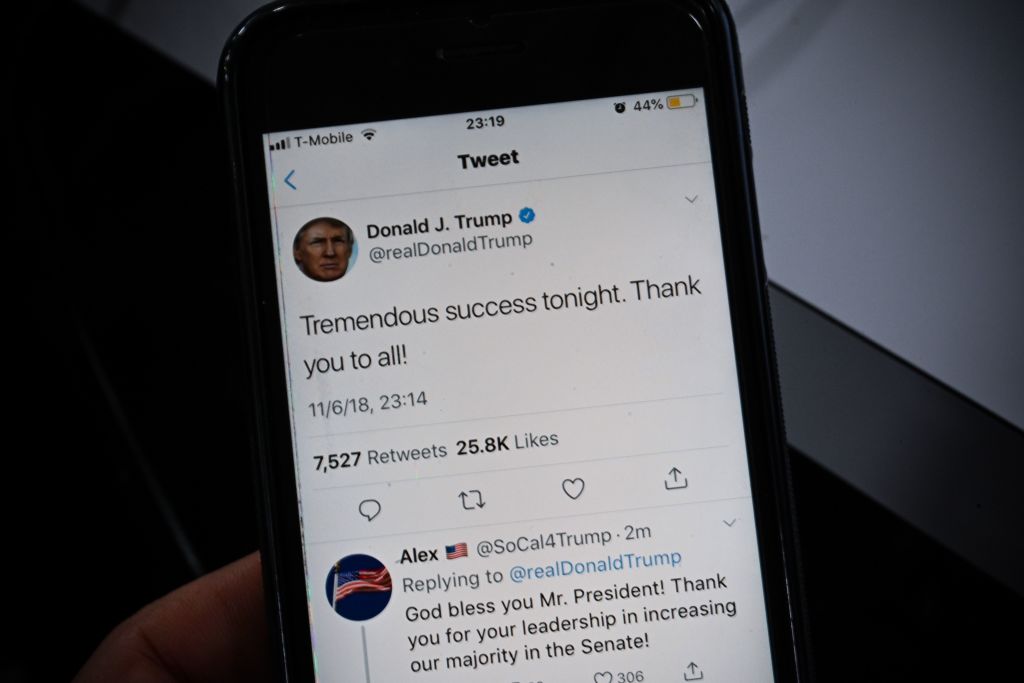This court ruling could set an important precedent for politicians on Twitter


A free daily email with the biggest news stories of the day – and the best features from TheWeek.com
You are now subscribed
Your newsletter sign-up was successful
Though it may seem we have been trapped in this digital hellscape for an eternity, Twitter is a mere 13 years old, and it has only served as a major portal of political communication for about a decade. That's not much time by legal standards, which means a lot of what public officials can and cannot do on social media remains ambiguous.
One pertinent question may be settled by a Monday ruling from the Fourth Circuit Court of Appeals, which held that a Virginia public official violated the First Amendment by blocking constituents on a Facebook page explicitly designated for public input. "[W]hy," the opinion asked, "should a municipality be allowed to engage in viewpoint discrimination when holding a virtual public meeting hosted on a private website when such discrimination would be unconstitutional if the meeting was held in a governmental building?"
The ruling could have broad implications, perhaps even for President Trump, whose @realdonaldtrump Twitter handle is ostensibly a private account but is often treated by the White House as a source of official communications. A case concerning whether Trump may block users with that account will be decided by the Second Circuit of Appeals sometime this year, and circuit courts often reference each other's decisions in their rulings.
The Week
Escape your echo chamber. Get the facts behind the news, plus analysis from multiple perspectives.

Sign up for The Week's Free Newsletters
From our morning news briefing to a weekly Good News Newsletter, get the best of The Week delivered directly to your inbox.
From our morning news briefing to a weekly Good News Newsletter, get the best of The Week delivered directly to your inbox.
A free daily email with the biggest news stories of the day – and the best features from TheWeek.com
Bonnie Kristian was a deputy editor and acting editor-in-chief of TheWeek.com. She is a columnist at Christianity Today and author of Untrustworthy: The Knowledge Crisis Breaking Our Brains, Polluting Our Politics, and Corrupting Christian Community (forthcoming 2022) and A Flexible Faith: Rethinking What It Means to Follow Jesus Today (2018). Her writing has also appeared at Time Magazine, CNN, USA Today, Newsweek, the Los Angeles Times, and The American Conservative, among other outlets.
-
 How the FCC’s ‘equal time’ rule works
How the FCC’s ‘equal time’ rule worksIn the Spotlight The law is at the heart of the Colbert-CBS conflict
-
 What is the endgame in the DHS shutdown?
What is the endgame in the DHS shutdown?Today’s Big Question Democrats want to rein in ICE’s immigration crackdown
-
 ‘Poor time management isn’t just an inconvenience’
‘Poor time management isn’t just an inconvenience’Instant Opinion Opinion, comment and editorials of the day
-
 ABC News to pay $15M in Trump defamation suit
ABC News to pay $15M in Trump defamation suitSpeed Read The lawsuit stemmed from George Stephanopoulos' on-air assertion that Trump was found liable for raping writer E. Jean Carroll
-
 Judge blocks Louisiana 10 Commandments law
Judge blocks Louisiana 10 Commandments lawSpeed Read U.S. District Judge John deGravelles ruled that a law ordering schools to display the Ten Commandments in classrooms was unconstitutional
-
 ATF finalizes rule to close 'gun show loophole'
ATF finalizes rule to close 'gun show loophole'Speed Read Biden moves to expand background checks for gun buyers
-
 Hong Kong passes tough new security law
Hong Kong passes tough new security lawSpeed Read It will allow the government to further suppress all forms of dissent
-
 France enshrines abortion rights in constitution
France enshrines abortion rights in constitutionspeed read It became the first country to make abortion a constitutional right
-
 Texas executes man despite contested evidence
Texas executes man despite contested evidenceSpeed Read Texas rejected calls for a rehearing of Ivan Cantu's case amid recanted testimony and allegations of suppressed exculpatory evidence
-
 Supreme Court wary of state social media regulations
Supreme Court wary of state social media regulationsSpeed Read A majority of justices appeared skeptical that Texas and Florida were lawfully protecting the free speech rights of users
-
 Greece legalizes same-sex marriage
Greece legalizes same-sex marriageSpeed Read Greece becomes the first Orthodox Christian country to enshrine marriage equality in law
